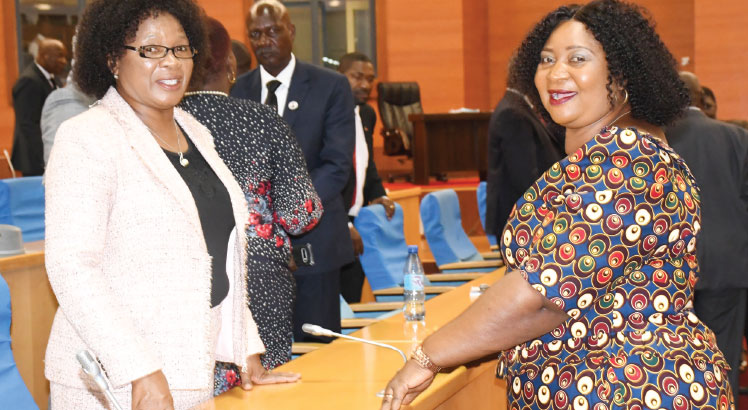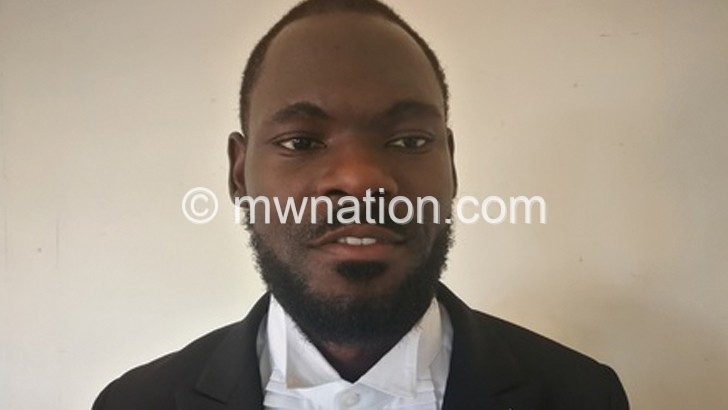Based on population statistics, women have always outnumbered men but when it comes to representation in elected offices it is often men dominating, generating fresh calls for affirmative action.
The Nation analysis yesterday on women representation in Malawi Parliament shows that since the country’s first democratic general elections in 1994, the number of women representation in Parliament has hovered below 25 percent.
During that year, women representation in Parliament was six percent while in 1999 it increased to 11 percent before reaching 13.5 percent in 2004.
The representation improved in the 2009 elections when women MPs reached 22.3 percent before dropping to 16.6 percent in the 2014 tripartite polls. In the 2019 elections, the number of women MPs increased to 0.8 percent.
In terms of local government councils, women representation hit 13.4 percent in 2014, but dropped to 11 percent in 2019 elections.
Female legislators interact in Parliament
Following this trend, the 50:50 Campaign Management Agency has made a fresh call to revive a Bill to initiate a quota for women in Parliament and local councils to improve the situation.
Speaking in an interview on Wednesday, 50:50 Campaign Management Agency team leader Viwemi Chavula said having a quota backed by law could lead to more female-friendly policies on jobs, health and education.
He faulted the first past-the-post electoral system for not empowering female candidates to achieve a fair representation in Parliament and local councils.
Chavula expressed fear that the female representation could drastically go down in the 2025 elections if the country maintains the current electoral system.
He said: “If we do not take action, we can completely go down to maybe 12 percent in female representation because this kind of system depends on goodwill.
“So, what we needed as a short-term measure is the whole issue of pushing towards the quota Bill.”
Chavula said there was already a quota Bill that was worked on and was being revised.
He said: “We have invested a lot as a country in the Bill following the Law Commission report of 2017 which recommended that 28 seats [in Parliament to be competed for by women] and then there is now a layman’s Bill that is sitting at the Ministry of Justice.”
Chavula noted that another challenge that affects fair female representation is how political parties handle their primary elections, which mostly are marred by violence.
He said: “A lot of women face difficulties in terms of access and control of resources. There is need to have programmes that could economically empower women.
“A programme like 50-50 Campaign will never support a candidate’s campaign in terms of reaching out to the whole electoral circle.”
In a separate interview yesterday, political scientist Nandin Patel echoed Chavula’s sentiments on the need to introduce the quota if the country is to achieve a fair female representation.
She observed that most political parties’ candidates nomination processes are chaotic and discourage women from participating in the elections.
“There must be intra-party democracy in these political parties, but also various organisations should have a positive approach to work with political parties,” said Patel.
Parliamentary Women’s Caucus chairperson Roseby Gadama in an interview yesterday attributed poor female performance in elections to political parties’ lack of political will.
She said the push for a quota law would be ideal.
Gadama said the country’s political parties seem to lack clear strategies that support female candidates during elections, adding that in other countries, they insist that a third of candidates are women.
She said: “So, if you check in most of the country’s political parties, you will find that few women are in position, this also speaks volume on lack of political will.
“The other challenge is that most organisations that support women always come late with their support, but we have women who are capable of winning the elections.”
In separate interviews, Malawi Congress Party (MCP) secretary general Eisenhower Mkaka and UTM Party secretary general Patricia Kaliati as well as Democratic Progressive Party (DPP) publicity secretary Nicholas Dausi said they have policies that support female candidates in the elections.
Said Mkaka: “If the quota Bill is tabled in Parliament, our party will support it, but it is also up to the women themselves to have interest to contest in the elections.”
He said, MCP in 2014 wanted more women to contest in parliamentary elections, but the move backfired because the women were not supported.
Mkaka’s sentiments are backed by an Afrobarometer round six survey that year titled ‘In Malawi, women lag behind men in political participation and activism’ which found that almost a quarter of Malawians believe that men make better political leaders than women.
Due to the challenges women face in elections, in 2017, a Special Law Commission proposed in 2017 that Section 62(1) of the Constitution be amended so that the composition of the National Assembly should include a district constituency where only women candidates would contest.
This was going to make a legal provision for increased participation of women in elected office and governance.
The proposal sought to ensure an automatic addition of 28 women parliamentarians while both male and female candidates would continue to battle it out for the 193 seats.
However, the provision was removed from the Constitution (Amendment) Bill Number 2 debated in Parliament in that year.
Justifying the removal of the proposal, then minister of Justice and Constitutional Affairs Samuel Tembenu said it had the potential to disadvantage women candidates in other constituencies.
The post Fresh push for Women leaders appeared first on The Nation Online.
 Moni Malawi
Moni Malawi 

